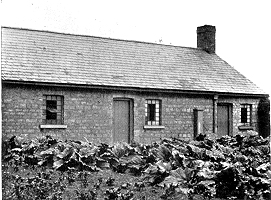|
|
A Month in an English Poorhouse,
Page 5 of 9  The Tramp House
In no case did it seem to me that the amount of work required was unreasonable. Many of the more infirm old men do nothing except stroll about the walks in the grounds or sit on a bench in the sun. One confined to a wheeled chair was wheeled out each day by his more fortunate companions. One courtyard is reserved for the men, the other for the women. The old women have a comfortable sitting-room which they use in common, and in this room those who can walk about spend most of the daylight hours. Opening out of this room, on the back side of the women’s wing of the building, and shut in by a high wall, is “the old ladies’ garden,” one of the brightest spots about the place. Here the female inmates are at liberty to wander at will; and a pleasanter place, with its soft green grass, roses and other flowers, quaint old yew trees, and comfortable benches, it would be hard to find. I secured a snap shot at a group of women who had clustered in the door of the sitting room one day to wonder what I was about. When they saw the picture afterwards, and learned that I was going to take it home with me, one old woman who was in the extreme background raised a prodigious wail of disgust and dissatisfaction that she had not been brought more fully into view, declaring that she didn’t see any reason why she “shouldn’t go over the water just as well as the rest of them hussies.” This “going over the water” I found was almost invariably the way in which the lower classes of people all over England speak of going to America. For them there is but one body of water and one destination. Back of the women’s garden is a playground for the girls, also with a high wall, now little used, since there are so few children; and back of the men’s ward is a large yard for the boys, to which they have access at almost all hours, and in which I watched many a game of cricket. The rules of the house are few, but those few are enforced. At six at night all must be in the house or in their courtyards, and the gates are locked. At a later hour all are locked into their respective sleeping wards. No visitors come or go without being recorded in a book kept by the porter; and the main gates of the grounds are locked at nine every night. None of the inmates are allowed to leave the grounds without permission, unless they take it upon themselves to leave permanently, in which case they cannot return if, as often happens, they wish to, without a new certificate of admission from the relieving officer. Men who wish to go out get permission from the master, women from the matron. Unless there is some reason |
|
5
Books & articles appearing here are modified adaptations
from a private collection of vintage books & magazines. Reproduction of these pages is prohibited without written permission. © Laurel O'Donnell, 1996-2006.
|
|

